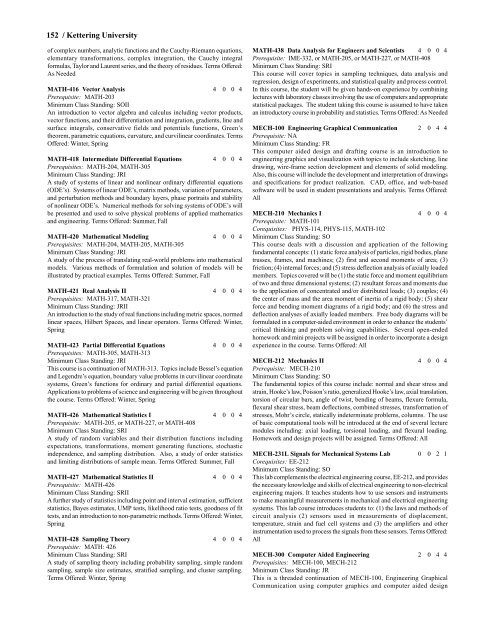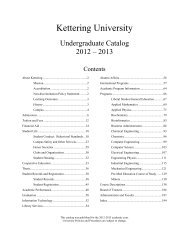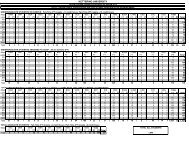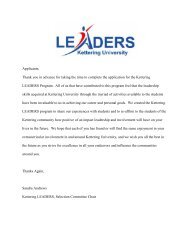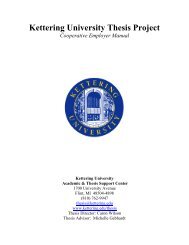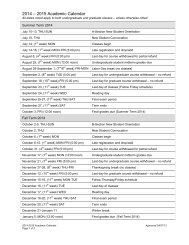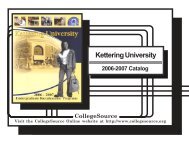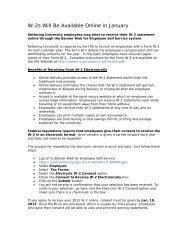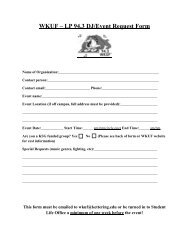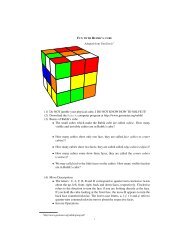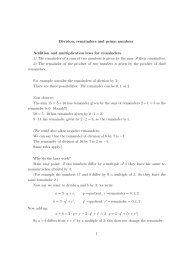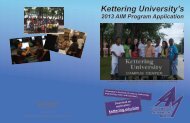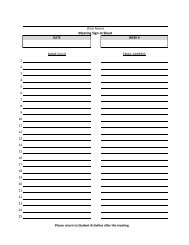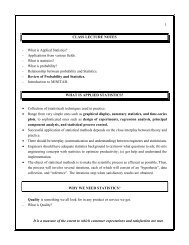2007-2008 Undergraduate Catalog - Kettering University
2007-2008 Undergraduate Catalog - Kettering University
2007-2008 Undergraduate Catalog - Kettering University
You also want an ePaper? Increase the reach of your titles
YUMPU automatically turns print PDFs into web optimized ePapers that Google loves.
152 / <strong>Kettering</strong> <strong>University</strong><br />
of complex numbers, analytic functions and the Cauchy-Riemann equations,<br />
elementary transformations, complex integration, the Cauchy integral<br />
formulas, Taylor and Laurent series, and the theory of residues. Terms Offered:<br />
As Needed<br />
MATH-416 Vector Analysis 4 0 0 4<br />
Prerequisite: MATH-203<br />
Minimum Class Standing: SOII<br />
An introduction to vector algebra and calculus including vector products,<br />
vector functions, and their differentiation and integration, gradients, line and<br />
surface integrals, conservative fields and potentials functions, Green’s<br />
theorem, parametric equations, curvature, and curvilinear coordinates. Terms<br />
Offered: Winter, Spring<br />
MATH-418 Intermediate Differential Equations 4 0 0 4<br />
Prerequisites: MATH-204, MATH-305<br />
Minimum Class Standing: JRI<br />
A study of systems of linear and nonlinear ordinary differential equations<br />
(ODE’s). Systems of linear ODE’s, matrix methods, variation of parameters,<br />
and perturbation methods and boundary layers, phase portraits and stability<br />
of nonlinear ODE’s. Numerical methods for solving systems of ODE’s will<br />
be presented and used to solve physical problems of applied mathematics<br />
and engineering. Terms Offered: Summer, Fall<br />
MATH-420 Mathematical Modeling 4 0 0 4<br />
Prerequisites: MATH-204, MATH-205, MATH-305<br />
Minimum Class Standing: JRI<br />
A study of the process of translating real-world problems into mathematical<br />
models. Various methods of formulation and solution of models will be<br />
illustrated by practical examples. Terms Offered: Summer, Fall<br />
MATH-421 Real Analysis II 4 0 0 4<br />
Prerequisites: MATH-317, MATH-321<br />
Minimum Class Standing: JRII<br />
An introduction to the study of real functions including metric spaces, normed<br />
linear spaces, Hilbert Spaces, and linear operators. Terms Offered: Winter,<br />
Spring<br />
MATH-423 Partial Differential Equations 4 0 0 4<br />
Prerequisites: MATH-305, MATH-313<br />
Minimum Class Standing: JRI<br />
This course is a continuation of MATH-313. Topics include Bessel’s equation<br />
and Legendre’s equation, boundary value problems in curvilinear coordinate<br />
systems, Green’s functions for ordinary and partial differential equations.<br />
Applications to problems of science and engineering will be given throughout<br />
the course. Terms Offered: Winter, Spring<br />
MATH-426 Mathematical Statistics I 4 0 0 4<br />
Prerequisite: MATH-205, or MATH-227, or MATH-408<br />
Minimum Class Standing: SRI<br />
A study of random variables and their distribution functions including<br />
expectations, transformations, moment generating functions, stochastic<br />
independence, and sampling distribution. Also, a study of order statistics<br />
and limiting distributions of sample mean. Terms Offered: Summer, Fall<br />
MATH-427 Mathematical Statistics II 4 0 0 4<br />
Prerequisite: MATH-426<br />
Minimum Class Standing: SRII<br />
A further study of statistics including point and interval estimation, sufficient<br />
statistics, Bayes estimates, UMP tests, likelihood ratio tests, goodness of fit<br />
tests, and an introduction to non-parametric methods. Terms Offered: Winter,<br />
Spring<br />
MATH-428 Sampling Theory 4 0 0 4<br />
Prerequisite: MATH: 426<br />
Minimum Class Standing: SRI<br />
A study of sampling theory including probability sampling, simple random<br />
sampling, sample size estimates, stratified sampling, and cluster sampling.<br />
Terms Offered: Winter, Spring<br />
MATH-438 Data Analysis for Engineers and Scientists 4 0 0 4<br />
Prerequisite: IME-332, or MATH-205, or MATH-227, or MATH-408<br />
Minimum Class Standing: SRI<br />
This course will cover topics in sampling techniques, data analysis and<br />
regression, design of experiments, and statistical quality and process control.<br />
In this course, the student will be given hands-on experience by combining<br />
lectures with laboratory classes involving the use of computers and appropriate<br />
statistical packages. The student taking this course is assumed to have taken<br />
an introductory course in probability and statistics. Terms Offered: As Needed<br />
MECH-100 Engineering Graphical Communication 2 0 4 4<br />
Prerequisite: NA<br />
Minimum Class Standing: FR<br />
This computer aided design and drafting course is an introduction to<br />
engineering graphics and visualization with topics to include sketching, line<br />
drawing, wire-frame section development and elements of solid modeling.<br />
Also, this course will include the development and interpretation of drawings<br />
and specifications for product realization. CAD, office, and web-based<br />
software will be used in student presentations and analysis. Terms Offered:<br />
All<br />
MECH-210 Mechanics I 4 0 0 4<br />
Prerequisite: MATH-101<br />
Corequisites: PHYS-114, PHYS-115, MATH-102<br />
Minimum Class Standing: SO<br />
This course deals with a discussion and application of the following<br />
fundamental concepts: (1) static force analysis of particles, rigid bodies, plane<br />
trusses, frames, and machines; (2) first and second moments of area; (3)<br />
friction; (4) internal forces; and (5) stress deflection analysis of axially loaded<br />
members. Topics covered will be (1) the static force and moment equilibrium<br />
of two and three dimensional systems; (2) resultant forces and moments due<br />
to the application of concentrated and/or distributed loads; (3) couples; (4)<br />
the center of mass and the area moment of inertia of a rigid body; (5) shear<br />
force and bending moment diagrams of a rigid body; and (6) the stress and<br />
deflection analyses of axially loaded members. Free body diagrams will be<br />
formulated in a computer-aided environment in order to enhance the students’<br />
critical thinking and problem solving capabilities. Several open-ended<br />
homework and mini projects will be assigned in order to incorporate a design<br />
experience in the course. Terms Offered: All<br />
MECH-212 Mechanics II 4 0 0 4<br />
Prerequisite: MECH-210<br />
Minimum Class Standing: SO<br />
The fundamental topics of this course include: normal and shear stress and<br />
strain, Hooke’s law, Poisson’s ratio, generalized Hooke’s law, axial translation,<br />
torsion of circular bars, angle of twist, bending of beams, flexure formula,<br />
flexural shear stress, beam deflections, combined stresses, transformation of<br />
stresses, Mohr’s circle, statically indeterminate problems, columns. The use<br />
of basic computational tools will be introduced at the end of several lecture<br />
modules including: axial loading, torsional loading, and flexural loading.<br />
Homework and design projects will be assigned. Terms Offered: All<br />
MECH-231L Signals for Mechanical Systems Lab 0 0 2 1<br />
Corequisites: EE-212<br />
Minimum Class Standing: SO<br />
This lab complements the electrical engineering course, EE-212, and provides<br />
the necessary knowledge and skills of electrical engineering to non-electrical<br />
engineering majors. It teaches students how to use sensors and instruments<br />
to make meaningful measurements in mechanical and electrical engineering<br />
systems. This lab course introduces students to: (1) the laws and methods of<br />
circuit analysis (2) sensors used in measurements of displacement,<br />
temperature, strain and fuel cell systems and (3) the amplifiers and other<br />
instrumentation used to process the signals from these sensors. Terms Offered:<br />
All<br />
MECH-300 Computer Aided Engineering 2 0 4 4<br />
Prerequisites: MECH-100, MECH-212<br />
Minimum Class Standing: JR<br />
This is a threaded continuation of MECH-100, Engineering Graphical<br />
Communication using computer graphics and computer aided design


